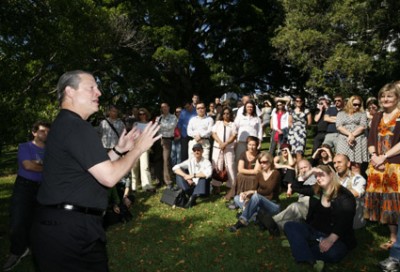Al Gore’s Inconvenient Truth is transforming my life, as it’s transformed so many others. [11 September 2007 | Peter Boyer]
How a year can change things! This time in 2006 I was minding my own business, earning a buck and enjoying my leisure. That life has gone – maybe forever.

Al Gore and Australian Climate Project trainees at the first Australian training session, Sydney, November 2006
Now I struggle to focus on my paid work while continually being distracted by my unpaid vocation – talking to people about our changing climate.
I don’t think I’m an evangelist. I didn’t raft the Franklin or tree-sit in the Styx. I’m not a regular at environmental rallies. But every so often something comes along that demands your attention.
That’s climate change. Big. Urgent. And insistent.
Over many years, when it was my job to communicate the science of Antarctica and the Southern Ocean, I learned that polar regions were signalling changes that would affect everyone, everywhere. Not just humans, but every living thing on the planet.
I put this aside when my Antarctic career ended in 2002. What could one individual, not a scientist, not a politician, do about this… imponderable? I got on with my life.
“The most important movie you’ll ever see” was how a reviewer described Al Gore’s An Inconvenient Truth. So I went along to check it out.
There are many memorable things about this film. What impressed me most was Al Gore’s positive belief that the battle is there to be won. And his own example. As a former politician he could have retreated in comfort to farm or boardroom life, but he chose to swim against the current, to speak out on something that bothered him.
In October last year I read in The Mercury that the Australian Conservation Foundation was looking for volunteers to spread the Al Gore message. I applied, and was selected with 83 other Australians to go to Sydney and get the good oil from Big Al himself.
Our task is to go out among our fellow-Australians and help them understand that there is a problem, that we have no option but to act, and that prompt action can turn it around. That’s how the climate is changing this life, and many others.
Over coming weeks, this column will record how Tasmanians are dealing with global warming. I’ll write about how scientists came to their conclusions, about what warming temperatures will mean for Tasmanians and the world, about the new paradigms that we and our politicians need to adopt, and what’s happening in our communities that give cause for optimism.
____________________
Ten things Tasmanians should know about climate change
1 Tasmania’s greenhouse gas emissions per person are low compared to other Australian states, but high by world standards.
2 Individual Australians are among the top carbon polluters in the world. Most estimates of greenhouse gas emissions per person put us in the top three countries, with the United States and Canada.
3 In the Southern Ocean right next door to Tasmania is a major “hotspot” in which temperatures will continue to rise for the next half-century.
4 Rising sea temperatures and increasingly acid seawater spell danger for Tasmania’s fishing industries, notably salmon farming, lobsters and shellfish.
5 In the next few years we will begin paying for our carbon (fossil fuel) use, no matter which government wins the next election. Both parties are committed to an emissions trading scheme, which will put a price on carbon.
6 Tasmania has been getting steadily drier and warmer over the past 100 years.
7 CSIRO modelling suggests Tasmania’s north, northeast, midlands, east coast and southeast will continue to get warmer and drier in the years to 2040.
8 The biggest greenhouse gas emitters and water users (per person) in Tasmania live in greater Hobart and greater Launceston.
9 Widely-cited estimates of sea level rises this century (about 0.4 metres) do not take account of any large-scale loss of ice from Antarctica or Greenland.
10 Australia is one of only two countries – the other is the United States – which, having signed the Kyoto Protocol on climate change in 1997, refused to ratify it.
